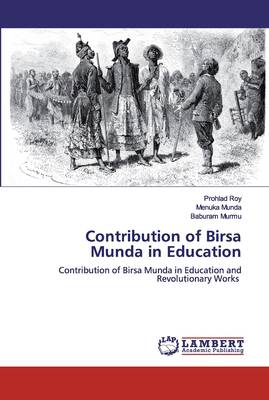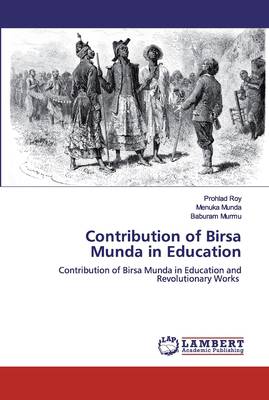
- Afhalen na 1 uur in een winkel met voorraad
- Gratis thuislevering in België vanaf € 30
- Ruim aanbod met 7 miljoen producten
- Afhalen na 1 uur in een winkel met voorraad
- Gratis thuislevering in België vanaf € 30
- Ruim aanbod met 7 miljoen producten
Zoeken
Contribution of Birsa Munda in Education
Prohlad Roy, Menuka Munda, Baburam Murmu
Paperback | Engels
€ 43,95
+ 87 punten
Omschrijving
Birsa millenarian movement in both its political and religion aspects against the background of the disintegrating tribal socio-economic system the latter half of the nineteenth century. In pursuance of the same ends Birsa envisaged, in a larger, political- religious context, a new dispensation to be established through the violent expulsion of all enemies of the tribe, and a society hermetically sealed against outside influences, puritan- cally oriented, nostalgically looking back to its golden past.Birsa's movement aimed at the total reconstruction of the tribal culture. The society of the future was to be woven out of religious warp and political woof: Birsa's religion and Raj, politico-religion ends and means were inseparable. The movement and its leadership was typical of the tribal world of the nineteenth century and cannot and should not be judged by the standards of nationalism and non-violence.
Specificaties
Betrokkenen
- Auteur(s):
- Uitgeverij:
Inhoud
- Aantal bladzijden:
- 84
- Taal:
- Engels
Eigenschappen
- Productcode (EAN):
- 9786200506092
- Verschijningsdatum:
- 3/01/2020
- Uitvoering:
- Paperback
- Formaat:
- Trade paperback (VS)
- Afmetingen:
- 152 mm x 229 mm
- Gewicht:
- 136 g

Alleen bij Standaard Boekhandel
+ 87 punten op je klantenkaart van Standaard Boekhandel
Beoordelingen
We publiceren alleen reviews die voldoen aan de voorwaarden voor reviews. Bekijk onze voorwaarden voor reviews.











